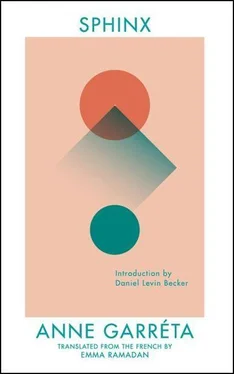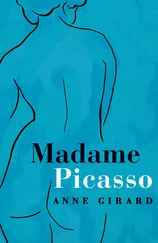Anne Garreta - Sphinx
Здесь есть возможность читать онлайн «Anne Garreta - Sphinx» весь текст электронной книги совершенно бесплатно (целиком полную версию без сокращений). В некоторых случаях можно слушать аудио, скачать через торрент в формате fb2 и присутствует краткое содержание. Год выпуска: 2015, Издательство: Deep Vellum Publishing, Жанр: Современная проза, на английском языке. Описание произведения, (предисловие) а так же отзывы посетителей доступны на портале библиотеки ЛибКат.
- Название:Sphinx
- Автор:
- Издательство:Deep Vellum Publishing
- Жанр:
- Год:2015
- ISBN:нет данных
- Рейтинг книги:3 / 5. Голосов: 1
-
Избранное:Добавить в избранное
- Отзывы:
-
Ваша оценка:
- 60
- 1
- 2
- 3
- 4
- 5
Sphinx: краткое содержание, описание и аннотация
Предлагаем к чтению аннотацию, описание, краткое содержание или предисловие (зависит от того, что написал сам автор книги «Sphinx»). Если вы не нашли необходимую информацию о книге — напишите в комментариях, мы постараемся отыскать её.
is a remarkable linguistic feat and paragon of experimental literature that has never been accomplished before or since in the strictly-gendered French language.
Anne Garréta
Pas un jour Emma Ramadan
Monospace
Sphinx — читать онлайн бесплатно полную книгу (весь текст) целиком
Ниже представлен текст книги, разбитый по страницам. Система сохранения места последней прочитанной страницы, позволяет с удобством читать онлайн бесплатно книгу «Sphinx», без необходимости каждый раз заново искать на чём Вы остановились. Поставьте закладку, и сможете в любой момент перейти на страницу, на которой закончили чтение.
Интервал:
Закладка:
Garréta believed that equality could not exist within a language that puts the two genders in opposition to each other, and so created a language and a world in which amorous relationships are not determined by a binary of distinction. This diffraction of constructed identities is an important aspect of queer theory, which Garréta defined at a talk in 2013 at Sciences Po in Paris as “an enterprise of deconstruction of categories that comprise a particular ontology of sexes and of sexualities.” To read Sphinx is to engage in this deconstruction.
Translating Sphinx into English, I never had to deal with any of the verb tense agreement problems that Garréta was constantly confronted with. It would be impossible for a first-person narrator speaking in English to reveal his or her gender without speaking about it explicitly. And so the constraint of this Oulipian text at first seemed only to crop up in the sections in which the narrator speaks about A***, when I was faced with possessive adjectives at every turn. Garréta took advantage of the fact that, in French, gender agrees with the object, meaning that in the phrase son bras, son is in the masculine because bras is a masculine noun, not because the person the arm belongs to is a man, while in English this phrase would normally be translated as his or her arm. This rule of French grammar makes it difficult for those learning French to remember to refer to a thigh as “she” and a neck as “he,” but provides a way for Garréta to avoid revealing the gender of her characters.
Where Garréta enlisted possessive adjectives to avoid gendered language, I alternated between four different strategies in English: using a demonstrative, dropping the article altogether, pluralizing, or repeating A***’s name. In other places, I rewrote certain passages to avoid personal pronouns, or applied adjectives directly to the subject rather than to something possessed by the subject. I broke Garréta’s code by creating a new one. Because writing with a constraint does not add up to being constrained by your writing. Rather, it means bending your text to accommodate your ideas, interrogating the words of your language and finding out how they can be used to feed your whims.
But it would be missing the point to list the places where Garréta’s text was one thing and mine became another. The constraint is in every sentence, every verb, every adjective of the French text. The entire narrative, almost every detail of the story and the style used to tell it, was shaped by the fact that there are no gender markers for the narrator or his or her lover, A***. The words wrap around their own limits, but without conforming to them; rather, the constraint and the writing become one and the same.
Focusing on the verbs in particular, the enormous difficulty of Garréta’s enterprise becomes obvious, as does the masterful way Garréta made the text breathe within the framework she designed. In order to avoid gender agreement with certain verbs in the past tense, Garréta often uses the imparfait instead of the passé composé, but the imperfect tense implies an action that was repeated many times in the past or done regularly. And so the narrator, je, is always taking up habits: the habit of wandering, of skipping classes and studying for exams at home, of going to nightclubs with a priest, of playing the same songs while DJing, of visiting A*** before reporting for DJ duty, of sitting at a certain table at Café de Flore, of contemplating bodies, specifically A***’s body, of calling A*** on the phone every morning, of going into all kinds of bars and clubs and talking to mobsters and socialites alike, of staying up all night and sleeping during the day. Repetition can be boring, and the narrator knows it, constantly lamenting his or her state of ennui, his or her lack of a vocation and thus the endless aimless wandering, the mechanic repetition of mixing the turntables and talking to the same detestable people in the Apocryphe, the torturous cycles of fighting and making up with A***.
And actions that were not continuous? Garréta makes the passé simple work for her. The passé simple is the literary past tense, meaning a past tense used only in written French. It has no real equivalent in English, as it comes off as much higher in register and more unusual than our commonly used simple past tense (e.g. I went to the Apocryphe). Best of all, it does not require gender agreement, as do certain verbs in the passé composé. But it’s not as simple as that. As I said, the passé simple is not commonly used. It sticks out. It wouldn’t have been possible for Garréta to insert it wherever she needed to and then leave the rest of the verbs in the passé composé. In order to become natural, not to signal a linguistic constraint, it had to become a part of the text, but more than that, a part of the narrative. And so it becomes part of the narrator’s identity — he or she is a rather pretentious, bourgeois(e) scholar who does not shy away from praising his or her own intelligence. One would expect for someone like je to use the passé simple in a memoir. And so even though in my Sphinx the narrator does not need to use a high literary style to avoid revealing his or her gender, this aspect of the narrator’s personality is a part of Garréta’s text that cannot simply disappear in translation.
In the same vein, although the English-speaking narrator might simply go places in my translation, my text has been inexorably infected by the strategies Garréta employed in hers. Lacking a good English equivalent to the passé simple, my text had to sway in a different way to craft the same personality for the narrator, accommodating elevated or unusual vocabulary when possible in order to keep the tone and register the same in English as in French. For example, by translating the French word immondices on page 45 of Garréta’s text as “putrescence” instead of the more banal “filth” or “waste.”
Similarly, Garréta often uses sentence fragments in order to avoid the verb altogether. Garréta turns this, too, into a part of the story, and the fragments enact what is being stated within the chopped clauses: je can only remember moments with A*** through fragments. Memory blurred, je can only describe bits and pieces of their time together, bits and pieces of A***’s body. And it doesn’t stop there: the narrator is often in the company of men, whose gender takes precedence for agreement even if the narrator is a woman; je is often being dragged along places by other people, making je the object of the verb instead of the subject, requiring no gender agreement. None of the linguistic means Garréta employs to avoid using gender markers for the two lovers is obvious, nothing sticks out, everything is woven into the fabric of the narrative itself.
Including the language used to describe A***. The narrator can never describe A*** directly, as almost all adjectives in French have to agree with the gender of the person being described. Therefore, A*** is described indirectly. The narrator talks about A***’s skin, arms, shoulder, scent, residual imprint, thighs, mass of hair, curved neck, so that the adjectives agree with the gender of that particular body part in French and not with A***’s gender. A*** is also referred to as various nouns, including a spirit, a being, an other, a beautiful creature, a strange character, a phantomlike figure, a child, a vision, a funereal existence, a cadaver, a living cadaver, a life, a body, a beloved body, an inanimate body, an ephemeral body, a parasitic body, so that the adjectives agree with these nouns and, again, not with A***’s gender. Sometimes A*** is missing from the sentence altogether where there normally would be an object, for example when the narrator says, “Je me surpris à desirer, douloureusement” (“I was surprised to find myself desiring, painfully”), or “Qu’était-ce? Regarder si longtemps dormir” (literally: “What did I get out of watching [___] sleep?”) — desiring who? Watching who sleep? Based on context, the object of these sentences is obvious, but there is still something missing — A***.
Читать дальшеИнтервал:
Закладка:
Похожие книги на «Sphinx»
Представляем Вашему вниманию похожие книги на «Sphinx» списком для выбора. Мы отобрали схожую по названию и смыслу литературу в надежде предоставить читателям больше вариантов отыскать новые, интересные, ещё непрочитанные произведения.
Обсуждение, отзывы о книге «Sphinx» и просто собственные мнения читателей. Оставьте ваши комментарии, напишите, что Вы думаете о произведении, его смысле или главных героях. Укажите что конкретно понравилось, а что нет, и почему Вы так считаете.












